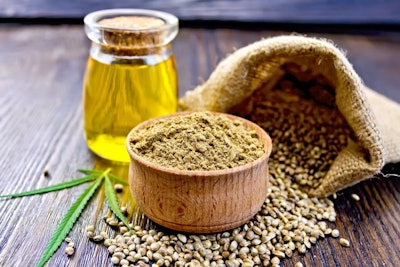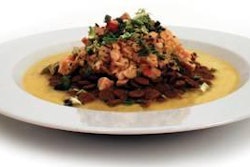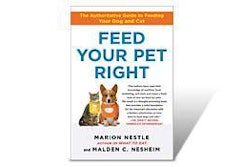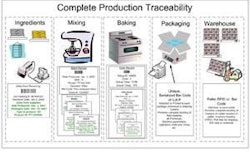
Dogs and cats could — legally — enjoy their own hemp-based edibles by the end of 2019, hemp advocates say, and animal feed ingredients for seven additional species are likely to see approval soon thereafter.
Research regarding five potential hemp-derived animal feed ingredients is in the works, according to Hunter Buffington, program manager at the Hemp Feed Coalition. Hemp seed oil, hemp flour and hemp seed cake as well as hemp-derived silage and pulp all show promise as animal feed ingredients, she said — and there could be even more potential applications.
The U.S. Food and Drug Administration (FDA) has agreed to an expedited review of use of hemp seed oil in dog and cat foods. Consequently, Buffington and many others believe the oil will be an approved pet food ingredient by the end of 2019, or shortly thereafter.
Intense consumer demand for pet foods including hemp is part of what’s driving the rush, according to Bill Bookout, president of the National Animal Supplement Council. The legalization of medical and even recreational marijuana — which consumers often conflate with hemp — has piqued interest among pet owners who believe foods or treats containing hemp may help with anxiety or other conditions. Some pet products containing hemp are already on the market, despite their unapproved status.
“Hemp is the hottest topic in the industry right now,” Bookout said. “I get a dozen calls a week on the dog, cat and horse side. There is significant interest on the production animal side as well, and those markets are much larger than the dog and cat side.”
While the hemp oils in question don’t actually have any psychoactive or medicinal properties as some in the public believe, they offer valuable nutritional benefits, according to Darcy Bomford, founder and CEO of TrueLeaf, a British Columbia company that already has several hemp-based pet supplements on the market. Hemp oil is a well-balanced blend of omega-3 and omega-6 fatty acids; the ground seed is a gluten-free, vegetarian protein source. And Bomford, like many others, believes the initial approval of hemp oil for dogs and cats will open the door to other ingredients and additional species.
Once oils are approved, hemp flour, also sometimes called hemp protein powder, is next on the list, said Steve McGarrah, CEO of High Plains Nutrition. But McGarrah and others involved in the process believe the flour approval — which will likely also start with cats and dogs — could take another year and a half to two years, because the FDA has not granted an abridged study for hemp proteins.
Poultry, sheep likely to see approvals first
It’s not certain which production species will be the first to enjoy hemp feeds, but Buffington believes either sheep or poultry will win the current research race. Among poultry, hemp may have interesting benefits for broilers, which enjoy bulking up on the high-protein seeds, and layers, in which hemp oils and seeds appear to increase the omega-3 and -6 concentrations in eggs. But sheep enjoy backing from academic proponents, who are footing the bill for research in that species.
Although cows and swine seem to enjoy hemp pulps and cakes — which are often discarded as waste products by hemp producers — approval for these species may still be some time off, Buffington said.
But with all this activity, the hemp feed industry could have a new problem on its hands this time next year.
“One of the big hurdles for the industry is going to be keeping up with capacity,” McGarrah said. “The potential demand is huge, much larger than most hemp farmers can keep up with.”
If demand outstrips supply, McGarrah said, hemp could price itself out of the production feed market.

















